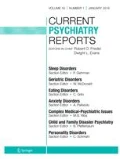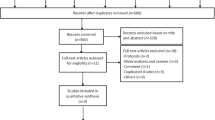Abstract
This paper reviews recent research on the use of electroconvulsive therapy (ECT) in elderly depressed patients. The PubMed database was searched for literature published within the past 4 years, using the search terms: “electroconvulsive elderly,” “electroconvulsive geriatric,” “ECT and elderly,” and “ECT elderly cognition.” The studies in this review indicate excellent efficacy for ECT in geriatric patients. Adverse cognitive effects of ECT in this population are usually transient and not typically severe. In addition, continuation/maintenance ECT (C/M-ECT) may be a favorable strategy for relapse prevention in the elderly after a successful acute course of ECT. ECT is an important treatment option for depressed geriatric patients with severe and/or treatment-resistant illness. New data add to the evidence demonstrating that ECT is a highly effective, safe, and well-tolerated antidepressant treatment option for geriatric patients.
Similar content being viewed by others
References
Papers of particular interest, published recently, have been highlighted as • Of importance
Task Force on Electroconvulsive Therapy. The practice of electroconvulsive therapy: recommendations for treatment, training, and privileging. 2nd ed. Washington: American Psychiatric Publishing; 2001.
Kerner N, Prudic J. Current electroconvulsive therapy practice and research in the geriatric population. Neuropsychiatry. 2014;4(1):33–54.
Kellner CH et al. ECT in treatment-resistant depression. Am J Psychiatry. 2012;169(12):1238–44.
Greenberg RM. Electroconvulsive therapy: a selected review. Am J Geriatr Psychiatry. 2015;13(4):268–81.
Manly DT, Oakley Jr SP, Bloch RM. Electroconvulsive therapy in old-old patients. Am J Geriatr Psychiatry. 2000;8(3):232–6.
Rhebergen D et al. Older age is associated with rapid remission of depression after electroconvulsive therapy: a latent class growth analysis. Am J Geriatr Psychiatry. 2015;23(3):274–82. The authors sought to define three course trajectories of clinical response to ECT (rapid remission, moderate response, nonremitting) in patients with MDD based on 6 weeks of follow-up using the HRSD-17. They found that old age was associated with rapid remission.
Rosen BH, Kung S, Lapid MI. Effect of Age on Psychiatric Rehospitalization Rates After Electroconvulsive Therapy for Patients With Depression. J ECT. 2015. [Epub ahead of print].
Spaans HP et al. Speed of remission in elderly patients with depression: electroconvulsive therapy v. medication. Br J Psychiatry. 2015;206(1):67–71. In comparing an ECT RCT with a pharmacotherapy RCT, the authors found that unipolar depressed elderly patients receiving ECT remitted faster than those in the pharmacotherapy RCT.
Bjølseth TM et al. Clinical efficacy of formula-based bifrontal versus right unilateral electroconvulsive therapy (ECT) in the treatment of major depression among elderly patients: a pragmatic, randomized, assessor-blinded, controlled trial. J Affect Disord. 2015;175:8–17.
Kellner CH et al. Bifrontal, bitemporal and right unilateral electrode placement in ECT: randomized trial. Br J Psychiatry. 2010;196(3):226–34.
Bailine S et al. Electroconvulsive therapy is equally effective in unipolar and bipolar depression. Acta psychiatry Scand. 2010;121(6):431–6.
Mahgoub N et al. Symptoms and observations: differences in time course during electroconvulsive therapy in geriatric depressed patients. J ECT. 2014;30(1):e7–8.
Oudega ML et al. White matter hyperintensities, medial temporal lobe atrophy, cortical atrophy, and response to electroconvulsive therapy in severely depressed elderly patients. J Clin Psychiatry. 2011;72(1):104–12.
Oudega ML et al. White matter hyperintensities and cognitive impairment during electroconvulsive therapy in severely depressed elderly patients. Am J Geriatr Psychiatry. 2014;22(2):157–66.
Oudega ML et al. Contribution of white matter hyperintensities, medial temporal lobe atrophy and cortical atrophy on outcome, seven to twelve years after ECT in severely depressed geriatric patients. J Affect Disord. 2015;185:144–8.
Prolonging Remission in Depressed Elderly (PRIDE). ClinicalTrials.gov Identifier: NCT01028508.
Kellner CH et al. Brief pulse and ultrabrief pulse right unilateral electroconvulsive therapy (ECT) for major depression: efficacy, effectiveness, and cognitive effects. J Clin Psychiatry. 2014;75(7):777.
Dines P, Hu W, Sajatovic M. Depression in later-life: an overview of assessment and management. Psychiatr Danub. 2014;26 Suppl 1:78–84.
Riva-Posse P, Hermida AP, McDonald WM. The role of electroconvulsive and neuromodulation therapies in the treatment of geriatric depression. Psychiatr Clin North Am. 2013;36(4):607–30.
Bjølseth TM et al. Baseline cognitive function does not predict the treatment outcome of electroconvulsive therapy (ECT) in late-life depression. J Affect Disord. 2015;185:67–75.
Dybedal GS et al. The Role of Baseline Cognitive Function in the Neurocognitive Effects of Electroconvulsive Therapy in Depressed Elderly Patients. Clin Neuropsychol. 2015;29(4):487–508.
Dybedal GS et al. Cognitive side-effects of electroconvulsive therapy in elderly depressed patients. Clin Neuropsychol. 2014;28(7):1071–90.
Verwijk E et al. Short- and long-term neurocognitive functioning after electroconvulsive therapy in depressed elderly: a prospective naturalistic study. Int Psychogeriatr. 2014;26(2):315–24. Elderly depressed patients receiving 2X/weekly ECT showed no significant decrease in global cognitive function, memory, or executive function measures within one week and six months after ECT compared to baseline. Significant improvements were seen on several neuropsychological measures at both time points.
Hausner L et al. Efficacy and cognitive side effects of electroconvulsive therapy (ECT) in depressed elderly inpatients with coexisting mild cognitive impairment or dementia. J Clin Psychiatry. 2011;72(1):91–7. Hausner and colleagues studied cognitive performance in geriatric patients after an acute course of ECT as a function of pre-existing (baseline) cognitive impairment. After an initial, nonsignificant cognitive decline in all patients following an acute course of ECT, patients with or without mild cognitive impairment showed improvements at various time points after the acute course, while those with dementia showed no significant change in cognition.
Jelovac A, Kolshus E, McLoughlin DM. Relapse following successful electroconvulsive therapy for major depression: a meta-analysis. Neuropsychopharmacology. 2013;38(12):2467–74.
Kellner CH. Relapse after electroconvulsive therapy (ECT). J ECT. 2013;29(1):1–2.27.
van Schaik AM et al. Efficacy and safety of continuation and maintenance electroconvulsive therapy in depressed elderly patients: a systematic review. Am J Geriatr Psychiatry. 2012;20(1):5–17.
Shelef A et al. Acute electroconvulsive therapy followed by maintenance electroconvulsive therapy decreases hospital re-admission rates of older patients with severe mental illness. J ECT. 2015;31(2):125–8. In a retrospective chart review, the authors used psychiatric readmission rates and duration of admission to assess the efficacy of M-ECT in elderly patients with schizophrenia and severe affective disorders. Readmission rates and length of admission were both decreased with M-ECT.
Semkovska M, McLoughlin DM. Objective cognitive performance associated with electroconvulsive therapy for depression: a systematic review and meta-analysis. Biol Psychiatry. 2010;68(6):568–77.
Coffey CE, Kellner CH. Electroconvulsive therapy. In CE Coffey, JL Cummings, MR Lovell, & GD Pearlson (Eds.), The American Psychiatric Press textbook of geriatric neuropsychiatry (pp. 829–859). Whashington, DC: American Psychiatric Press; 2000.
Author information
Authors and Affiliations
Corresponding author
Ethics declarations
Conflict of Interest
Emma T. Geduldig declares no conflict of interest.
Charles H. Kellner reports grant support from the National Institute of Mental Health, royalties from Cambridge University Press, and honoraria from Psychiatric Times, UpToDate, and the North Shore-LIJ Health System.
Human and Animal Rights and Informed Consent
This article does not contain any studies with human or animal subjects performed by any of the authors.
Additional information
This article is part of the Topical Collection on Geriatric Disorders
Rights and permissions
About this article
Cite this article
Geduldig, E.T., Kellner, C.H. Electroconvulsive Therapy in the Elderly: New Findings in Geriatric Depression. Curr Psychiatry Rep 18, 40 (2016). https://doi.org/10.1007/s11920-016-0674-5
Published:
DOI: https://doi.org/10.1007/s11920-016-0674-5



